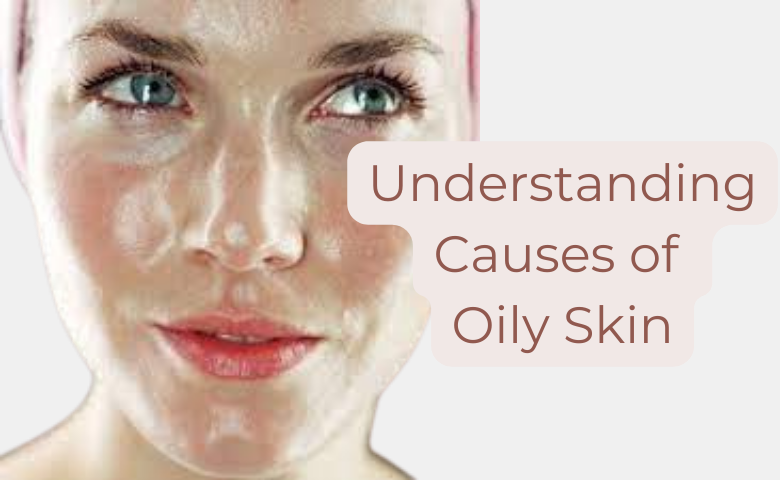
Everyone desires a glowing complexion, but you may be experiencing a shinier appearance than you’d like. Your skin might feel heavy and greasy after applying skincare and makeup. Take a moment to consider your skin – have you ever wondered, “Why is my skin so oily?” or thought about understanding the causes of oily skin? You’re not alone. Nearly 75% of people report experiencing occasional to frequent breakthrough shine.”
In this article, you will get to know about what can cause oily skin and their internal or root causes. Also known about to dealing with this skin type to get the best results for improving your texture and complexion.
What is Oily Skin and its Characteristics?
Oily skin occurs when the sebaceous glands produce too much sebum, leading to clogged pores and acne. Various factors, including genetics, hormones, diet, and skincare habits, can influence oily skin. Sebum is an oily substance and one of the characteristics of oily skin that helps protect and moisturize the skin, but excessive production can result in clogged pores, blemishes, and premature skin aging.
Are you of many who are eager to understand the causes of oily skin? Then keep reading this article.
What are the Causes of Oily Skin?
Here are the causes of oily skin on the face can typically be attributed to several internal causes of oily skin:
Genetics:
Genetics determines skin type, so if oily skin runs in your family, you’re more likely to have it too. Whether it’s an oily forehead, a shiny chin, or greasy cheeks, some people have larger and more active sebaceous glands. While you can’t change this inherited trait, you can manage it by establishing a proper skincare routine. If your parents or siblings have oily skin, there’s a good chance that you will too. Genetics play a role in how much oil your skin produces compared to others.
Diet:
Research has indicated that dietary components affect the body’s sebum production. Oily skin can result from eating a diet high in inflammatory foods, including dairy, refined sugar, and processed carbs. Your diet dramatically impacts how much oil your body produces, so if you consume many greasy foods like fries, burgers, and chips, your sebaceous glands will make too much oil, leading to breakouts and spots on your face.
Additionally, eating a lot of carbohydrates and sugars might aggravate acne because they alter blood sugar, which throws your hormones off balance.
Here you can read about Diet Tips for reducing Oily skin.
Environmental Factor:
A contributing cause of oily skin could be the humidity level in your environment. You may notice an oily nose because higher humidity can increase the flow of oils and sebum around your t-zone. Additionally, oily skin is often blocked, clogged, and prone to breakouts. You can use a niacinamide-infused sheet mask for oily skin to reduce oiliness on hot and muggy days. This will help to address excess sebum and blemishes while deeply hydrating and rebalancing your skin.
Stress:
Plenty of research supports the link between skin issues and stress as a root cause of oily skin. Stress hormone levels in the body grow under stress, which may increase oil production. Naturally, this can lead to breakouts, which block pores and prolong the cycle of oily skin. Even though stress management is a challenge for everyone, understanding the underlying reasons of oily skin can help address your skin issues from the inside out. Maintain consistency in your oily skincare and makeup routine to nourish your skin during stressful times. Disturbances in the appearance and texture of your skin can naturally be another source of stress.
Incorrect Skincare Products:
Using wrong skin care products for your skin type might also result in oily skin. Some people use excessively thick creams, for example, because they believe that mixed skin is greasy.
If you have dry skin in the winter, you might need to adjust your skin care regimen for the spring and summer to include lighter moisturizers and gel-based cleansers. The amount of oil on your face significantly changes depending on your skin care products.
Incorrect Skincare Habbit:
Oil production may go up as a result of this irritation. Over-shampooing is a very typical mistake made by people with oily skin. And because it leads to an excessive production of sebum and oil; this error is one of the main reasons for oily skin. People with oily skin often use harsh cleansers to reduce oil production. But this usually irritates the skin and causes acne. Applying a mild vitamin C cleaner to address this problem is recommended. Thanks to this, your face will be perfectly cleansed without losing any of its natural oils.
Lack of Hydration:
The most prominent misconception regarding oily skin is that moisturizing is unnecessary. On the other hand, dehydration is a significant contributor to oily skin. If your skin isn’t sufficiently moisturized or hydrated, it will produce more oil to make up for the dryness. This leads to an overproduction of sebum by the skin’s glands, which is the cause of oily skin.
Pros and Cons of Oily Skin:
Although oily skin might be bothersome, there are Pros as well. Here are a few advantages of having oily skin:
- People with oily skin look more radiant and revitalized than those with dry skin, which often appears lifeless and drab.
- Because oily skin has more natural oils and moisturizers to keep it supple and silky, it may age slower than dry or sensitive skin types.
- Thickness is more common in oily skin than in normal or dry skin. Its ability to tolerate damage and irritation makes it more resilient than other skin types.
Certain Cons come with having oily skin, which are listed below.
- reveals more pores and draws dirt more readily.
- Oily skin requires more frequent cleaning than dry or mixed skin because makeup doesn’t stay on it as long.
- More prone to irritation, blemishes, breakouts of acne, and blackheads.
How to Stop Face From Being So Oily?
Wash Face Regularly:
Remember to wash your face daily to keep your pores clear and prevent debris from getting trapped. Cleanse your face gently with warm water twice a day to remove extra oil and grime. Avoid harshly cleaning or massaging your skin, as this can cause irritation and increase oil production. Also, refrain from using any products containing alcohol, as they can cause skin dryness and increase oil production.
Control Oil Throughout The Day:
Utilize blotting sheets as required. To prevent shine all day, apply an oil-absorbing powder on top of your foundation or moisturizer as needed! Furthermore, avoid touching your face with your hands; touching your face transfers oils, debris, and germs that lead to acne.
Exfoliate One or Two Times a Week:
If you have oily skin, exfoliating is a great technique for getting rid of dead skin cells and clearing your pores. Just be careful not to go overboard. When exfoliating, using too much force might harm your skin and increase its vulnerability to acne breakouts. Apply just enough pressure to gently remove dead skin cells without damaging any capillaries or causing discomfort or redness.
Avoid Touching Your Face:
Avoid touching your face unnecessarily, especially if you have oily skin. – It may be tempting to wipe away excess oil, but doing so can spread bacteria and clog your pores. – Always wash your hands before touching your face, or use portable face wipes for a quick cleanse on the go.
Take care of Skin:
It’s always beneficial to maintain a basic skincare routine to give your skin enough breathing room. Don’t cut corners with your products. Investing in high-quality skincare products, even if they exceed your budget, will pay off in the long run. Before using a product on your face, do a patch test. Only buy products that have been dermatologist-tested.
Conclusion:
Understanding the causes of oily skin is crucial for effectively managing and improving your skin’s health and appearance. From genetics and diet to environmental factors and stress, various elements can contribute to excessive sebum production, leading to clogged pores and breakouts. Additionally, using incorrect skincare products and habits can exacerbate the issue, while a lack of proper hydration often triggers the skin to produce even more oil.
Despite its challenges, oily skin has benefits, such as a more radiant complexion and potentially slower aging due to its natural moisture. By adopting a balanced skincare routine tailored to your skin type focusing on gentle cleansing, proper hydration, and regular exfoliation you can mitigate the disadvantages and enhance the natural advantages of oily skin.
